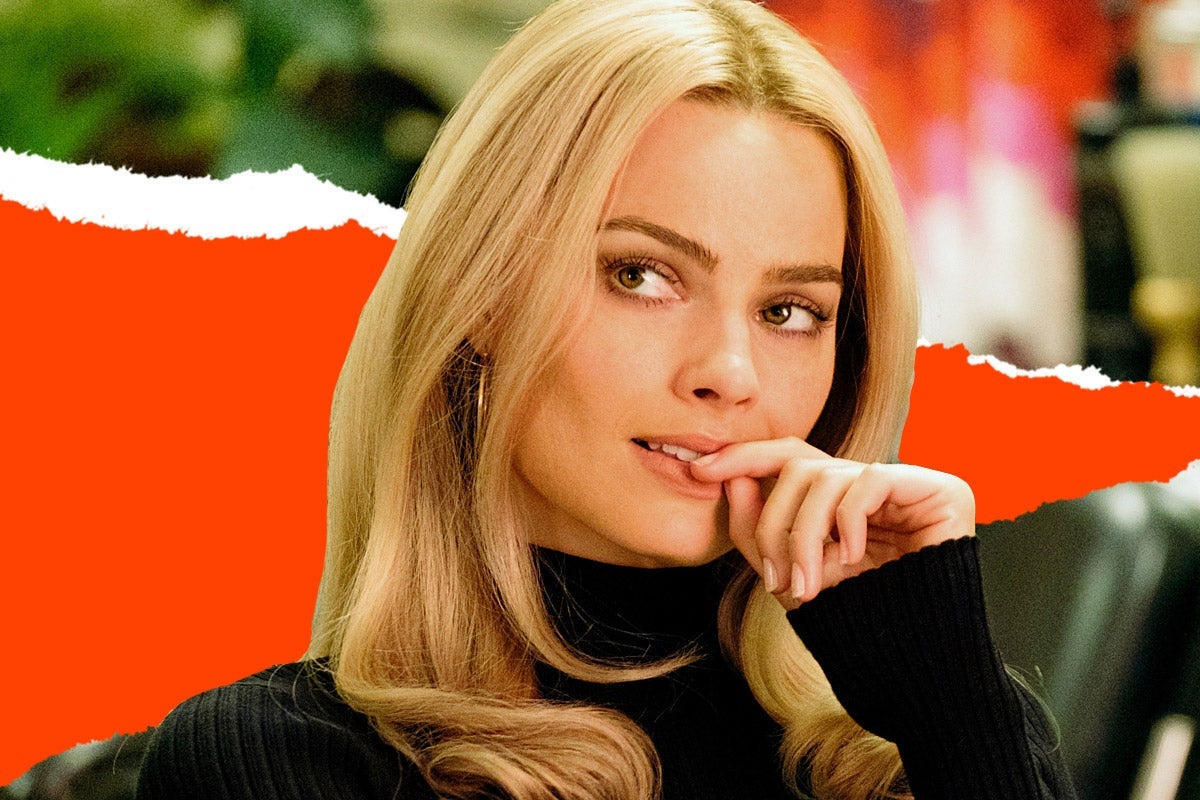
Margot Robbie in Once Upon a Time in Hollywood.
Photo illustration by Slate. Photo by Sony Pictures.
In Slate’s annual Movie Club, film critic Dana Stevens emails with fellow critics—this year, Bilge Ebiri, Karen Han, and Alison Willmore—about the year in cinema. Read the first entry here. Read the previous dispatch in the series here.
Dear Dana, Bilge, and Alison,
If you will, allow me to begin with a brief tangent into the world of video games. Gaming auteur Hideo Kojima’s latest work, Death Stranding, features a cameo from director Jordan Vogt-Roberts as “the Director,” lamenting the loss of movie theaters and that communal experience in the post-apocalyptic wasteland. It’s funny in part because it’s an obvious nod to Kojima’s cinephilia—Death Stranding features the likenesses of Mads Mikkelsen, Léa Seydoux, Guillermo del Toro, Edgar Wright, and Nicolas Winding Refn as characters—but also because his very game is best as a communal experience. Journeys through the abandoned landscape are augmented by structures that other players have built in order to make their, and subsequently your, travels easier.
I mention this because there seems to be some inexorable pull to the shared experience that defies the passage of time. It’s why movies like The Rocky Horror Picture Show, The Room, and now Cats endure: The experience of going to a big room full of people who are just as enthralled or appalled as you are can only be had at the movie theater. Further proof of that power, ironically, seems to be in TV programs, as shows like Game of Thrones and Watchmen prove that there’s still value to forcing people to be at a certain place at a certain time rather than watching at their leisure.
Bilge, you’re completely right in saying that corporations seek to drive us the way of Wall-E, but I think, unlike the lemmings who were pushed to their deaths in Disney’s White Wilderness, we won’t go so easily. The real test, I think, is coming soon, in the form of the Marvel shows Disney will shuttle to Disney+. Marvel Studios’ Kevin Feige has said that future Marvel movies will depend on some familiarity with Marvel’s Disney+ shows, but I don’t know if that’ll be enough to drive people to the platform. Marvel Cinematic Universe spectacles are the definition of the modern event movie; will audiences be willing to invest extra time and money just to understand what’s going on before they can cheer superheroes in the theater?
It also helps that there are still big filmmakers pushing for the theatrical experience to remain something sacred—Christopher Nolan’s penchant for IMAX, Ang Lee’s obsession with high frame rates, Quentin Tarantino’s sheer nostalgia. Remember the roadshow engagement of The Hateful Eight? Or, for that matter, Margot Robbie as Sharon Tate in Once Upon a Time, watching herself on that big, beautiful screen at the Bruin Theater? As the audience reacts to the pratfalls playing out on-screen, Tate’s face lights up, drinking in the sheer joy of watching a movie. It’s a totally earnest scene, the purest distillation of Tarantino’s love of movies, more so than his genre tributes and constant references.
It certainly helps to present going to the movies as an event. But I think there’ve been movies this year that prove that won’t be uniformly true. Parasite wasn’t the final entry in a cinematic universe, nor a 3½-hour behemoth from a well-known Western director. The Korean movie broke through—subtitles and all—based solely on its strength as a film. It didn’t need to be presented as an event; everyone just knew it had to be seen. The same goes, I think, for titles like The Farewell and Uncut Gems, which have made an impact through good marketing and word of mouth.
Even Cats falls somewhere in between event-movie and movie-movie. It’s a fever dream to be shared with everyone you see it with, but also an event in that it’s a train wreck that must—and will—be seen to be believed. It wasn’t marketed as a must-see picture in the way that Avengers: Endgame and The Irishman were, but that’s what it’s become, at least among the internet-savvy and theater-obsessed who don’t want to spend the rest of their lives knowing they missed this chance. I’ll be seeing it a second time over the holidays, not because the film is particularly worth revisiting, but because the experience is.
To tie up my Death Stranding comparison, the state of affairs in movieland may look dire, but we continue to build bridges for each other, whether it’s in the form of Parasite, The Irishman, or Cats. It may sometimes feel like you’re traveling a crumbling landscape alone as Netflix, Disney, and other corporate giants lay waste to what we’d once found familiar, but there’s still proof of other life to be found—and, I think, there always will be.
Love to you, my Jellicle choices,
Karen
from Slate Magazine https://ift.tt/2F0hAik
via IFTTT
沒有留言:
張貼留言